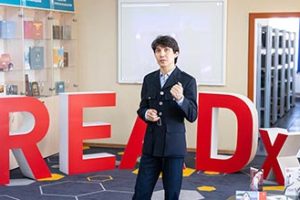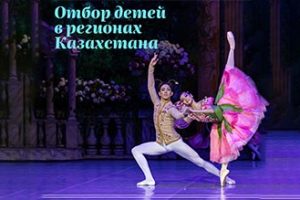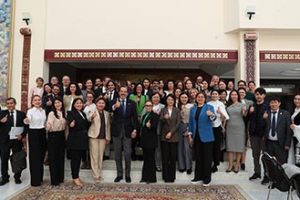World Education in Context of Coronacrisis
The total spread of a new form of coronavirus (COVID-19) in all countries of the world has become the number one problem and put the world economy and health at risk. Leaders of developed countries have recognized that the coronavirus pandemic threatens the world with a major crisis. “Because of the coronavirus, Germany faces such a serious challenge, which has not been seen since the Second World War,” German Chancellor Angela Merkel said in her address to the nation [1]. President of France Emmanuel Macron has called the coronavirus epidemic a threat to the existence of the European Union [2]. According to the President of Kazakhstan, Kassym-Jomart Tokayev, the coronavirus has had an extremely negative impact on the world economy, and Kazakhstan is already feeling the consequences of this colossal crisis.
After the announcement by the World Health Organization (WHO) of the COVID-19 pandemic, the educational process around the world has been disrupted. Measures of social isolation required partial or complete closure of educational institutions. As a result, the number of schoolchildren and students who do not attend schools or universities has grown rapidly.
The announced measures have led to accelerated digitalization of the educational environment. Conducting classes through various Internet platforms, online communication, video meetings in a short time has taken a traditional form.
As a result, the transition to online training of more than 1.5 billion people [3] around the world revealed the IT instability of dozens of universities, identified technical problems such as lack of server capacity and equipment.
Some universities, due to the fact that students do not have good Internet access, completely abandoned the educational process, completing the year in advance: for example, the experimental University of Berea in the United States. Apparently, the conditions of the credit system of training allowed the University Management to make such a flexible decision. Based on their capabilities, some universities took a break from the educational process without switching to online training, while others made a temporary transition for a few weeks to give teachers and students time to adapt.
Of course, it does not refer to top universities, which really can boast of a brilliant infrastructure, where online courses and programs have been practiced for years. For example, one of China’s elite universities, Tsinghua University, even teaches physical education online. Another example: the second largest university in Germany, the holder of the “elite” status, the Ludwig Maximilian University of Munich, gave the associate professors themselves the right to decide whether to conduct the current exams or not.
The Kazakh National Academy of Choreograph y(Nur-Sultan) was able to effectively implement the practice of remote training as well. Teachers had to take on a double burden: to quickly master different formats and platforms, to rebuild the content of training courses for online training, to prepare training materials and presentations, to upload them to the Platonus program – and this is not a complete list of “round-the-clock” work of the teacher at the computer. In addition, the audience of teachers has expanded, since the training process can now be observed by the parents of students. This period was stressful and responsible for everyone. Under these conditions, the Academy administration has done a lot of work to ensure the continuity and comfort of the educational process. Each team leader, with maximum interaction with their employees, made certain decisions that ensured the quality of teaching, maintaining an atmosphere of mutual assistance and support.
Now there are a lot of forecasts and predictions for life after coronavirus. For example, the American economist Nassim Taleb says that life will not be the same after the end of the pandemic. He notes that the trend towards online training and remote work will continue even after the removal of the quarantine regime.
In this regard, it would be noted that the prospects for updating are encouraging. Since transition to remote training, the Academy has hosted remote courses, seminars, online meetings with students, undergraduates and teachers, and round tables on a variety of topics. In a short time, many teachers and students of the Academy held events in a new and very exciting form. For example, on April 15, on the platform Facebookonlinedabol, senior teacher of the Department of Pedagogy of the Faculty of Choreography Sadykova A. A. held an online lecture on the topic “Kazakh Dance is the Heritage of National Culture” [4]. Unique lectures were held on the history of Kazakh dance (Izim T.O., Kulbekova A.K., Sadykova A.A.), etc. Another noteworthy event during the self-isolation was the presentation of the textbook “Basics of Directing Folk Stage Dance” by teacher-choreographer, Honored Worker of the Republic of Kazakhstan Alisheva A. T. Within the framework of the project “Star in Quarantine” of the MCS of Kazakhstan, the holder of the “Kurmet” order, senior teacher of the Kazakh National Academy of Choreography Borisova F.M. held a fascinating and very interesting live broadcast with the world ballet stars, Bakhtiyar Adamzhan and Aigerim Beketayeva [5].
Distance training, of course, has its negative sides. With this type of training, there is no personal contact between students and their teachers. Therefore, this form of training is not suitable for developing communication skills and mastering professions that require a lot of practice: for example, it causes a lot of difficulties for choreography and medicine.
We expect that the structure of the entire education system will change. It will not be surprising if online branches are open and in demand in the coming years.
The crisis creates not only problems, but also opportunities to see new horizons, capabilities for more effective action. Here and now, it is time to draw conclusions and make decisions.
https://www.gazeta.ru/army/2020/03/19/13011625.shtml 1
https://lenta.ru/news/2020/03/27/macron_euro/ 2
https://news.un.org/ru/story/2020/04/1376532 3
https://web.facebook.com/watchparty/693118918090801/?entry_source=USER_TIMELINE
https://youtu.be/uOuqU6zrc1o
Head of International Relations Department
Zhumagul A.N.





